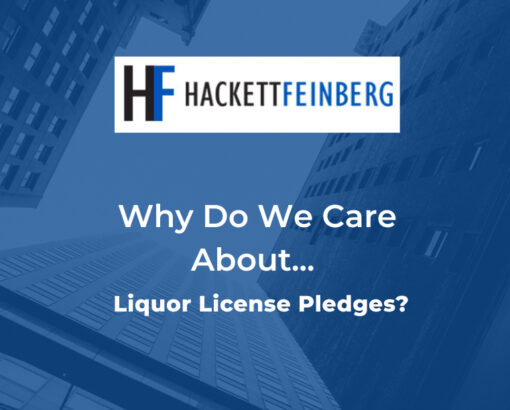
The value of a business such as a restaurant, bar, brewery, winery, or convenience or liquor store that sells alcohol is often closely linked to the value of its liquor license. The value of liquor licenses can vary widely depending on the city or town where a business is located. When a lender provides a loan to such a business, the valuation of the business will take into account its revenue from the sale of beer, wine or liquor.
As with any other collateral, lenders must secure the ability to control the disposition of the license that permits alcohol sales for on-premises or off-premises consumption in the event of loan default. Without a valid license, the value of a business may be severely diminished, making it challenging for a lender to recover a significant amount of its loan by foreclosing on assets of the business.
In the Commonwealth of Massachusetts, the Alcoholic Beverages Control Commission (the “ABCC”), through local licensing boards, grants liquor licenses to businesses that serve or sell alcohol. These local boards issue new licenses according to a quota system, considering factors such as zoning, land use, proximity to other licensed locations, traffic, and community support. The local licensing boards are also responsible for approving transfers of existing licenses and approving pledges of licenses to lenders as collateral for the loan obligations of the businesses. Due to the limited number of available licenses and related regulatory considerations, liquor licenses may have significant and measurable value, especially in the City of Boston.
State statutes permit the pledge of liquor licenses as loan collateral. However, these licenses remain subject to various compliance requirements, and violations may lead to license revocation. Despite the rare occurrence of a full revocation of the license, properly securing and perfecting an interest in a liquor license as collateral is critical for both lenders and borrowers.
Requiring a liquor license pledge as part of a collateral package allows lenders to better secure their interests. Without this pledge, a lender may not be able to foreclose upon or transfer the license, which can significantly decrease the value of the underlying business. If a liquor license is improperly transferred or abandoned, it is returned to the relevant municipality’s pool of available licenses and may be reissued at the discretion of the local authority. In these situations, a lender will lose the opportunity to sell the license to a third party and apply the sales proceeds to the loan balance.
Perfecting a security interest in a liquor license when not associated with a new application or transfer requires filing a separate Pledge of Collateral application, along with supporting documentation, with the ABCC via the local licensing authority. Local licensing authorities may hold hearings or request additional documents before submitting recommendations to the ABCC. Lenders must also file a UCC-1 financing statement with the Secretary of the Commonwealth detailing the type and number of the license. In cases related to the sale and transfer of a license, the local licensing authority’s review and approval of the proposed pledge can occur as part of the overall process (provided the borrower requests such approval in its application). If the request for pledge approval is a stand-alone transaction (i.e., not related to a sale or transfer of the license), municipalities typically process such requests promptly. Lenders should anticipate that pledge approval may not occur prior to a closing and be prepared to include post-closing requirements in the loan documents to ensure all approvals are obtained within a specified timeframe, potentially triggering an event of default if such requirements are unmet. If the ABCC does not approve a liquor license pledge or the security interest is not properly perfected, lenders may be unable to take possession of or transfer the license as part of the loan recovery process.
If a loan becomes troubled, but a bankruptcy case has not been filed, the workout process provides an opportunity for lenders to review existing pledges to determine whether additional action is needed to ensure that the liquor license has been properly pledged to the lender as collateral, and to require borrower cooperation to fix any issues.
Lenders are advised to consult with legal counsel to confirm that any pledged interest in a liquor license is fully secured and perfected. Hackett Feinberg P.C. frequently assists with liquor license pledges as part of commercial loan closings, including those involving institutional and SBA loans.
Sarah Wegman is an attorney in the firm’s transactional group specializing in real estate and commercial transactions, representing developers, small businesses, non-profit organizations, lenders and other financial institutions for institutional and U.S. Small Business Administration (SBA) loans. Sarah is also an experienced title agent, working with national title companies to issue title policies and endorsements to owners and lenders.
Brian F. Plunkett is a co-managing partner of the firm and has over 3 decades of experience in commercial and real estate finance, troubled loan workouts and secured party remedies.
Hackett Feinberg P.C. is a Boston law firm formed over 25 years ago with over 25 full-time attorneys specializing in Banking and Commercial Finance, Bankruptcy and Creditors Rights, Business and Corporate Law, Commercial Real Estate, Employment Litigation and Counseling, Lifetime, Trust and Estate Planning, Litigation and Dispute Resolution.
This communication is for informational purposes only and should not be construed as legal advice on any specific facts or circumstances.
